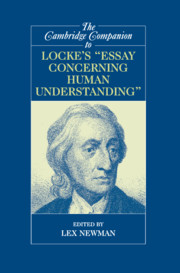Book contents
- Frontmatter
- Introduction
- 1 The Intellectual Setting and Aims of the Essay
- 2 Locke’s Polemic against Nativism
- 3 The Taxonomy of Ideas in Locke’s Essay
- 4 Locke’s Distinctions between Primary and Secondary Qualities
- 5 Power in Locke’s Essay
- 6 Locke on Substance
- 7 Locke on Ideas of Identity and Diversity
- 8 Locke on Ideas and Representation
- 9 Locke on Essences and Classification
- 10 Language, Meaning, and Mind in Locke’s Essay
- 11 Locke on Knowledge
- 12 Locke’s Ontology
- 13 The Moral Epistemology of Locke’s Essay
- 14 Locke on Judgment
- 15 Locke on Faith and Reason
- Bibliography
- Index of Names and Subjects
- Index of Passages Cited
9 - Locke on Essences and Classification
Published online by Cambridge University Press: 28 July 2007
- Frontmatter
- Introduction
- 1 The Intellectual Setting and Aims of the Essay
- 2 Locke’s Polemic against Nativism
- 3 The Taxonomy of Ideas in Locke’s Essay
- 4 Locke’s Distinctions between Primary and Secondary Qualities
- 5 Power in Locke’s Essay
- 6 Locke on Substance
- 7 Locke on Ideas of Identity and Diversity
- 8 Locke on Ideas and Representation
- 9 Locke on Essences and Classification
- 10 Language, Meaning, and Mind in Locke’s Essay
- 11 Locke on Knowledge
- 12 Locke’s Ontology
- 13 The Moral Epistemology of Locke’s Essay
- 14 Locke on Judgment
- 15 Locke on Faith and Reason
- Bibliography
- Index of Names and Subjects
- Index of Passages Cited
Summary
Locke introduces his famous distinction between real and nominal essences with little fanfare halfway through the third chapter of Book III of the Essay Concerning Human Understanding. This distinction is his own invention. Terminologically, it is clearly intended to reflect the Scholastic distinction between real and nominal definitions, but, as Leibniz complains, it is an innovation of Locke's to use these terms to refer to essences. “It seems to me,” Leibniz writes, “that your way of putting things constitutes a very novel mode of expression. People have certainly spoken of nominal definitions, and 'causal' or 'real' ones, but so far as I know they have not until now spoken of essences other than real ones” (Leibniz [1765] 1981: 293). Locke's novelty is a matter of altering terminology belonging in a theory of language to a metaphysical use, rather surprisingly, in the middle of the portion of his Essay entitled “On Words.” This innovation of Locke's, despite its rather modest entry into his argument, has been treated by most commentators as both important and central to his theory. Genevieve Brykman, indeed, describes it as a “cornerstone” of his thinking (2001: 81). But the nature of this cornerstone and its role in Locke's metaphysics and in his theory of language have proved controversial.
- Type
- Chapter
- Information
- Publisher: Cambridge University PressPrint publication year: 2007
- 5
- Cited by

